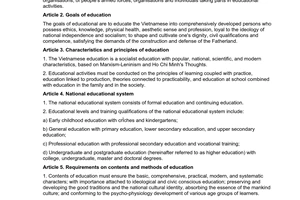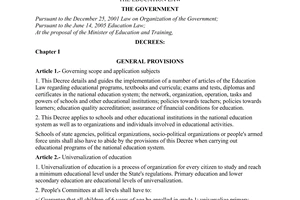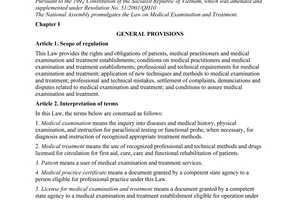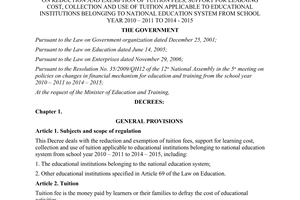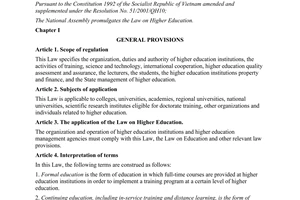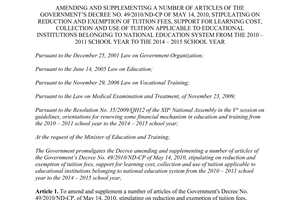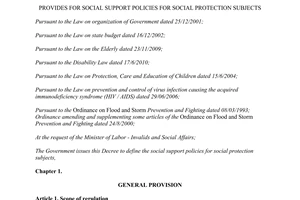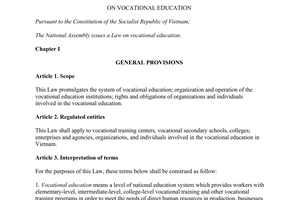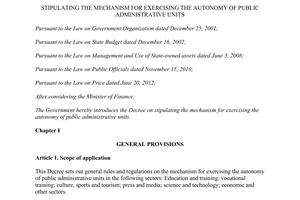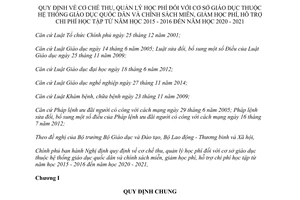Nội dung toàn văn Decree No. 86/2015/ND-CP fee exemption and reduction and financial support from academic
|
THE GOVERNMENT |
SOCIALIST REPUBLIC
OF VIETNAM |
|
No. 86/2015/ND-CP |
Hanoi, October 2, 2015 |
DECREE
ON MECHANISM FOR COLLECTION AND MANAGEMENT OF TUITION FEES APPLICABLE TO EDUCATIONAL INSTITUTIONS IN THE NATIONAL EDUCATION SYSTEM AND POLICIES ON TUITION FEE EXEMPTION AND REDUCTION AND FINANCIAL SUPPORT FROM ACADEMIC YEAR 2015 – 2016 TO 2020 – 2021
Pursuant to the Law on Government organization dated December 25, 2001;
Pursuant to the Law on Education dated June 14, 2005; Law on amendments to the Law on Education dated November 25, 2009;
Pursuant to the Law on Higher Education dated June 18, 2012;
Pursuant to the Law on vocational education dated November 27, 2014;
Pursuant to the Law on Medical examination and treatment dated November 23, 2009;
Pursuant to the Ordinance on People with meritorious services to the Resolution dated June 29, 2005; the Ordinance on amendments to the Ordinance on People with meritorious services to the Resolution dated July 16, 2012;
At the request of the Minister of Education and Training and the Ministry of Labor, War Invalids and Social Affairs,
The Government promulgates a Decree on mechanism for collection and management of tuition fees applicable to educational institutions in the national education system and policies on tuition fee exemption and reduction and financial support from the academic year 2015 – 2016 to 2020 – 2021,
Chapter I
GENERAL PROVISIONS
Article 1. Scope
The Decree deals with mechanism for collection and management of tuition fees applicable to educational institutions in the national education system and policies on tuition fee exemption and reduction and financial support from the academic year 2015 – 2016 to 2020 – 2021.
Article 2. Regulated entities
1. Children studying in pre-schools, students and postgraduate students studying in educational institutions in the national education system prescribed in the Law on Education, the Law on higher education, and Law on vocational education.
2. Educational institutions in the national education system prescribed in the Law on Education, the Law on higher education, and Law on vocational education.
Chapter II
TUITION FEES
Article 3. Rules for determining tuition fees
1. For public preschool education and compulsory education: tuition fees must be suitable for economic conditions of every administrative division, actual affordability of the people, and growth of annual consumer price index.
2. For public higher education and vocational education: educational institutions that exercise financial autonomy in terms of recurrent expenditures and investment as prescribed by the Government shall determine their tuition fees according to economic and technical norms or cost norms issued by competent authority and duration in which the training costs are fully covered. Public educational institutions that do not exercise financial autonomy in terms of recurrent expenditures and investment (hereinafter referred to as financial autonomy) as prescribed by the Government shall determine tuition fees according to the State’s grant and learners’ contribution according to the decline in State’s subsidies.
3. Every public educational institution providing high-quality program is entitled to collect an amount of tuition fees sufficient to cover training costs. Every non-public educational institution is entitled to decide their tuition fees.
4. The preschool education and compulsory education institutions shall announce their tuition fees in every academic year, higher education and vocational education institutions shall announce their tuition fees in every academic year and the entire course.
5. During the implementation of this Decree, the Ministry of Education and Training shall cooperate with the authorities in adjustments to tuition fee brackets applicable to higher education institutions and vocational institutions according to the principles of accurate and sufficient determination of training costs as prescribed in Decree No. 16/2015/ND-CP dated February 14, 2015 of the Government on autonomy mechanism of public service agencies.
Article 4. Tuition fee brackets of preschool education and compulsory education institutions
1. Tuition schedule of mass education programs in public preschool education and compulsory education institutions in the academic year 2015 – 2016:
Unit: VND 1,000/month/student
|
Region |
Academic year 2015 - 2016 |
|
1. Urban area |
From 60 to 300 |
|
2. Rural area |
From 30 to 120 |
|
3. Mountainous area |
From 8 to 60 |
2. From 2016 – 2017 onwards, the tuition fees shall be adjusted according to annual average growth of consumer price index announced by the Ministry of Planning and Investment.
3. Pursuant to Clause 1 and Clause 2 of this Article, People’s Councils of provinces shall prescribe annual specific tuition fees suitable for the conditions of their provinces.
4. High-quality public preschool education institutions and compulsory education institutions shall decide their own tuition fees to cover training costs , submit them to People's Committees of provinces for approval, and implement Regulation on transparency issued by the Ministry of Education and Training. The provision of tuition fee exemption and reduction for eligible learners in public and non-public high-quality preschools and compulsory education institutions shall comply with regulations on levels of tuition fee exemption and reduction applied to mass education program of public institutions in the same province.
5. Continuing education institutions are entitled to charge tuition fees equivalent to tuition fees charged by public compulsory institutions at the same level in the same province.
Article 5. Tuition schedule of higher education and vocational education
1. The maximum tuition fees applicable to mass training programs at public higher education institutions that exercise financial autonomy according to every discipline from academic year 2015 – 2016 to academic year 2020 – 2021 (including higher education institutions whose projects for pilot implementation of operation innovation are approved by the Prime Minister):
Unit: VND 1,000/month/student
|
Discipline |
From 2015-2016 to 2017-2018 |
From 2018-2019 to 2019-2020 |
Academic year 2020 - 2021 |
|
1. Social science, economics, law; agriculture, forestry, and aquaculture |
1,750 |
1,850 |
2,050 |
|
2. Natural sciences; engineering and technology; physical education and sports, art; hotel and tourism |
2,050 |
2,200 |
2,400 |
|
3. Medicine and pharmacy |
4,400 |
4,600 |
5,050 |
2. The maximum tuition fees applicable to mass training programs at public higher education institutions that do not exercise financial autonomy according to every discipline from academic year 2015 – 2016 to academic year 2020 – 2021:
|
Discipline |
Academic year 2015 - 2016 |
Academic year 2016 - 2017 |
Academic year 2017 - 2018 |
Academic year 2018 - 2019 |
Academic year 2019 - 2020 |
Academic year 2020 - 2021 |
|
1. Social science, economics, law; agriculture, forestry, and aquaculture |
610 |
670 |
740 |
810 |
890 |
980 |
|
2. Natural sciences; engineering and technology; physical education and sports, art; hotel and tourism |
720 |
790 |
870 |
960 |
1,060 |
1,170 |
|
3. Medicine and pharmacy |
880 |
970 |
1,070 |
1,180 |
1,300 |
1,430 |
3. The maximum tuition fees applicable to master or doctor training programs from academic year 2015 – 2016 to 2020 – 2021 equal (=) tuition fees prescribed in Clause 1 and Clause 2 of this Article multiplied by (x) the following coefficient:
|
Training level |
Coefficient in comparison with higher education |
|
1. Master |
1.5 |
|
2. Doctor |
2.5 |
4. The maximum tuition fees applicable to public colleges and vocational secondary schools:
a) The maximum tuition fees applicable to mass training programs in public colleges and vocation secondary schools that do not exercise financial autonomy:
Unit: VND 1,000/month/student
|
DISCIPLINE |
Academic year 2015 - 2016 |
Academic year 2016 - 2017 |
Academic year 2017 - 2018 |
Academic year 2018 - 2019 |
Academic year 2019 - 2020 |
Academic year 2020 - 2021 |
||||||
|
Vocational secondary school |
College |
Vocational secondary school |
College |
Vocational secondary school |
College |
Vocational secondary school |
College |
Vocational secondary school |
College |
Vocational secondary school |
College |
|
|
1. Social science, economics, law; agriculture, forestry, and aquaculture |
430 |
490 |
470 |
540 |
520 |
590 |
570 |
650 |
620 |
710 |
690 |
780 |
|
2. Natural sciences; engineering and technology; physical education and sports, art; hotel and tourism |
500 |
580 |
550 |
630 |
610 |
700 |
670 |
770 |
740 |
850 |
820 |
940 |
|
3. Medicine and pharmacy |
620 |
700 |
680 |
780 |
750 |
860 |
830 |
940 |
910 |
1.040 |
1.000 |
1.140 |
b) The maximum tuition fees applicable to mass training programs in public colleges and vocational secondary schools that exercise financial autonomy:
Unit: VND 1,000/month/student
|
DISCIPLINE |
From 2015-2016 to 2017-2018 |
From 2018-2019 to 2019-2020 |
Academic year 2020 - 2021 |
|||
|
Vocational secondary school |
College |
Vocational secondary school |
College |
Vocational secondary school |
College |
|
|
1. Social science, economics, law; agriculture, forestry, and aquaculture |
1,225 |
1,400 |
1,295 |
1,480 |
1,435 |
1,640 |
|
2. Natural sciences; engineering and technology; physical education and sports, art; hotel and tourism |
1,435 |
1,640 |
1,540 |
1,760 |
1,680 |
1,920 |
|
3. Medicine and pharmacy |
3,080 |
3,520 |
3,220 |
3,680 |
3,535 |
4,040 |
5. Tuition fees applicable to training programs at elementary level, continuing program and skill training shall be determined and charged by the educational institutions according to the unanimous agreement between learners and the educational institutions and assurance of transparency.
6. Regulations on collection of tuition fees charged by public higher education institutions and vocational institutions: According to the annual tuition policies, the characteristics of every institution, development requirements, training forms and actual conditions, Directors of national universities, universities, Principals and Heads of higher education institutions and vocational institutions affiliated to central government shall autonomously stipulate regulations on specific tuition collection applicable to units and training programs within their management competence according to the principles of transparency. People's Committees of provinces shall request People’s Council of provinces to decide the specific tuition fees applicable to higher education institutions and vocational institutions under management of the provinces.
7. With respect to higher education institutions and vocational institutions under direct monitoring of state-owned economic organizations or enterprises, those economic organizations and state-owned enterprises shall autonomously stipulate regulations on tuition collection suitable for every group of discipline or discipline and training cost compensation, and then they shall send reports to authorities in charge of higher education and vocational education institutions in the central government for approval. The tuition fees applicable to disciplines funded by government budget shall be charged according to the tuition brackets applicable to mass training programs of public vocational institutions and higher education institutions that have do not exercise financial autonomy prescribed in Article 5 of this Decree. The tuition fees charged by higher education institutions and vocational institutions under direct monitoring of state-owned economic organizations or enterprises shall be announced for every academic year and the entire course before enrollment. The government budget shall provide subsidies on tuition fees incurred by learners eligible for tuition fee exemption or reduction in higher education institutions and vocation institutions under direct monitoring of state-owned economic organizations and enterprises according to the maximum tuition fees equivalent to the mass training programs of public higher education institutions that do not exercise financial autonomy as prescribed in this Decree.
8. The tuition fees of higher education and vocational education following continuing education method shall be charged not exceeding 150% of tuition fees of full-time training programs of the same training level, group of discipline, and discipline of the mass training programs at higher education institutions and vocational institutions that do not exercise financial autonomy. The tuition fees applicable to short-term training courses shall be charged according to the agreement between the educational institutions and learners. The tuition fee exemption and reduction shall not apply to learners studying in continuing education institutions in the form of continuing and short-term training courses.
9. Tuition fees based on credits/modules: Tuition rate of a credit/module shall be determined according to total tuition fees of the entire course according to every discipline and the total number of credits/modules of the entire course as follows:
|
Tuition of a credit/module |
= |
Total tuition fee of the entire course |
|
Total number of credits/modules of the entire course |
Total tuition fee of the course = tuition fee per one student/month x 10 (months) x number of academic years.
10. Tuition fees applicable to high-quality training programs:
a) The tuition fees of high-quality training programs (including transfer programs from foreign countries regarding vocational education).
Public higher education institutions and vocational institutions providing high-quality programs shall unanimously decide their own tuition fees and subsidies from government budget to cover training costs, and then send reports to the authorities in charge of higher education and vocational education in the central government for approval and the institution shall announce it before enrollment.
b) The tuition fees applicable to foreign learners in Vietnamese educational institutions shall be unanimously decided by the educational institutions.
Chapter III
TUITION FEE EXEMPTION AND REDUCTION AND FINANCIAL SUPPORT
Article 6. Learners not liable to tuition fees
Entities not liable to tuition fees in public educational institutions include: elementary students; pedagogy students; learners of particular disciplines satisfying requirements for socio-economic development, national defense and security as prescribed in the Law on higher education.
Article 7. Learners eligible for tuition fee exemption
1. The people with meritorious services to the Resolution and their family prescribed in the Ordinance on People with meritorious services to the Resolution No. 26/2005/PL-UBTVQH11 dated June 29, 2005, Ordinance No. 04/2012/UBTVQH13 dated July 16, 2012 on amendments to the Ordinance on People with meritorious services to the Resolution.
2. The children studying in preschools and students who are disabled and encounter financial difficulties.
3. The children studying in preschools and students under 16 years of age prescribed in Clause 1 Article 5 of Decree No. 136/2013/ND-CP dated October 21, 2013 of the Government on social protection beneficiaries.
The learners aged between 16 and 22 who are subject to cases prescribed in Clause 1 Article 5 of Decree No. 136/2013/ND-CP dated October 21, 2013 of the Government on social protection beneficiaries and studying in compulsory schools, vocational schools, junior colleges, colleges, and university as the first degree.
4. The students who are studying in preschools, compulsory schools and have parents living in poor households as prescribed by the Prime Minister.
5. The students who are studying in preschools, compulsory schools and have parents who are non-commissioned officers and soldiers serving in a given term in People’s armed forces.
6. The students who are granted direct admission (including students in vocational boarding schools with training duration of at least 3 months).
7. The students of upper-secondary ethnic boarding schools, preparatory senior colleges, and preparatory faculties.
8. The students being ethnics in poor households and near poor households prescribed by the Prime Minister who are studying in vocational institutions and higher education institutions.
9. The students studying in Marxism - Leninism and Ho Chi Minh ’s Ideology.
10. The students and postgraduate students studying in the following disciplines: Tuberculosis, Leprosy, Psychiatry, Forensic Examination, Forensic Psychiatric and Pathology.
11. The students being ethnics in disadvantaged areas or severely disadvantaged areas as prescribed by competent authority.
12. The students studying in colleges, universities and postgraduate students in atomic energy field.
13. The lower secondary school’s graduates who are moving to vocational secondary schools.
14. The learners studying in vocational secondary schools or colleges in conformity with the social demand as mentioned in the list prescribed in the Head of vocational education authority in the central government despite of its low enrolment.
15. The learners studying particular disciplines in conformity with requirements for socio-economic development and national defense and security as prescribed in the Law on vocational education.
Article 8. Learners eligible for tuition fee reduction
1. Learners eligible for 70% reduction of tuition fees include:
a) The students studying in traditional art disciplines in public and non-public culture and art schools, including: Traditional theatre music performer, Hue traditional music performer, Southern amateur music and songs, traditional theatre actor, folk performing arts, traditional singing (ca trù, bài chòi), traditional instrument performing;
b) The students studying in traditional music (nhã nhạc, tuồng, chèo, cải lương), dance, circus; heavy, harmful or dangerous disciplines of vocational education. The list of heavy, harmful and dangerous disciplines shall be prescribed by the Ministry of Labor, War Invalids and Social Affairs;
c) The students being ethnics (other than extremely minor ethnics) in severely disadvantaged areas as prescribed by competent authority.
2. Learners eligible for of 50% reduction of tuition fees include:
a) The students having parents who are officials, workers or civil servants suffering occupational accidents or diseases and eligible for regular allowance receipt;
b) The students who are studying in preschools, compulsory schools and have parents near poor households as prescribed by the Prime Minister.
Article 9. Fixed-term tuition fee exemption
1. Upon a disaster, depending on the level and scope of damage, the People’s Committee of the province shall consider granting exemption from tuition fees within a fixed term to students of preschools and compulsory schools in the area suffering the disaster.
2. The State shall provide subsidies on tuition fees for public educational institutions and subsidies on tuition fees incurred by entities eligible for tuition fee exemption in the non-public educational institutions because of disaster as prescribed in Clause 1 of this Article according to the tuition fee levels of mass education in public educational institutions in the same administrative division.
Article 10. Learners eligible for financial support
1. The students studying in preschools or compulsory schools who are orphaned or disabled and encounter financial difficulties.
2. The students who are studying in preschools or compulsory schools and have parents living in poor households as prescribed by the Prime Minister.
Article 11. Mechanism for tuition fee exemption and reduction and financial support
1. The tuition fee exemption and reduction shall be granted throughout the study period of time at the school, except for cases of changes to reasons for exemption or reduction in tuition fees.
2. The government budget shall provide subsidies on tuition fees for public educational institutions to grant tuition fee exemption or reduction for eligible learners as prescribed in this Decree who are studying in those educational institutions with equivalent tuition fee levels. Every year, the subsidies on tuition fees for public educational institutions in terms of tuition fee exemption and reduction shall be accounted sufficiently and transparently.
The subsidies on tuition fees granted to vocational education institutions or higher education institutions applicable to mass training programs charged by public educational institutions that do not exercise financial autonomy according to every discipline or vocation shall be prescribed in this Decree.
Vocational education institutions and higher education institutions that exercise financial autonomy, vocational education institutions and higher education institutions that provide high-quality training programs shall award scholarships to learners as a priority to cover the difference between the State’s financial support and the tuition fee of the institution.
The State shall directly provide subsidies on tuition fees for learners eligible for tuition fee exemption and reduction who are studying in non-public preschools, compulsory schools according to the tuition fee brackets applicable to mass education programs of public schools, and who are studying in non-public vocational education and higher education institutions according to the tuition fee brackets applicable to mass education programs of public educational institutions that do not exercise financial autonomy in as prescribed in this Decree according to every group of disciplines, discipline and vocation.
3. The State shall directly grant financial support equivalent to VND 100,000/student per month to learners prescribed in Article 10 of this Decree for purchase of books, notebooks, and other learning materials. Duration of receiving financial support shall base on actual learning duration provided that it does not exceed 9 months per one academic year.
4. If a learner is eligible for both financial support prescribed in Clause 3 Article 11 of this Decree and another support prescribed in a legislative document with higher value, the latter support shall apply.
Article 12. Budget
The budget for policies prescribed in Article 9 and 11 of this Decree shall be allocated from annual government budget of Ministries, central and local authorities according to the current government budget decentralization. The central budget shall support local budget in financial difficulties as prescribed.
Chapter IV
COLLECTION AND USE OF TUITION FEES
Article 13. Collection of tuition fees
1. Tuition fees are collected monthly; termly or annually with the consent of the learners. With respect to preschool education institutions, continuing education institutions and short-terms courses, tuition fees shall be collected according to the actual number of learning months. With respect to compulsory education institutions, tuition fees shall be collected for 9 months per year. With respect to higher education institutions, tuition fees shall be collected for 10 months per year. With respect to an educational institution following credit system, it may collect tuition fees according to credits, provided that the tuition fee rate collected according to credits does not the academic year-based tuition fee rate.
2. Each public educational institution shall collect and transfer tuition fees to a State Treasury or a commercial bank for management and use as follows:
a) The public educational institution that exercises financial autonomy is entitled to transfer full amount of tuition fees to the commercial bank for management and use. Total interest on tuition fees deposited in the commercial bank shall be used to establish funds for scholarships and student aids;
b) The public educational institution that does not exercise financial autonomy in is entitled to pay full amount of tuition fees relevant to disciplines funded by government budget to the State Treasury for management and use; and transfer full amount of tuition fees relevant to disciplines not funded by government budget to the commercial bank for management and use. Total interest on tuition fees deposited in the commercial bank shall be used to establish funds for scholarships and student aids.
Article 14. Use of tuition fees
1. Public educational institutions shall use tuition fees as prescribed by the Government in terms of financial autonomy of public service providers.
2. Non-public educational institutions shall use tuition fees as prescribed by the Government in terms of private sector involvement incentives applicable to education, vocational education, health, culture, sports and environment.
Article 15. Management of tuition fees and reporting
1. Each public educational institution shall pay total amount of tuition fees to the State Treasury or the commercial bank as prescribed in Clause 2 Article 13 of this Decree. Each non-public educational institution shall pay total amount of tuition fees to the State Treasury or the commercial bank where it opens account.
2. All types of educational institutions must do accounting and release statistics of tuition fees as prescribed; follow requirements of inspection of finance and education authorities; and take legal responsibility for the accuracy and truthfulness of provided information and materials.
3. Receipts and expenditures on tuition fees of public educational institutions shall be included in the annual declaration of the educational institutions as prescribed.
Chapter V
IMPLEMENTATION
Article 16. Effect
1. This Decree comes into force from December 1, 2015.
2. This Decree replaces Decree No. 49/2010/ND-CP dated May 14, 2010 of the Government on tuition fee exemption and reduction, financial support and mechanism for collection and use of tuition fees applicable to educational institutions in the national education system from 2010 – 2011 to 2014 – 2015 and Decree No. 74/2013/ND-CP dated July 15, 2013 of the Government on amendments to Decree No. 49/2010/ND-CP dated May 14, 2010 of the Government on tuition fee exemption and reduction, financial support and policies on collection and use of tuition fees applicable to educational institutions in the national education system from 2010 – 2011 to 2014 – 2015 shall be annulled from the academic 2015 – 2016.
3. Learners prescribed in Point dd, Clause 3, Article 33 of the Government's Decree No. 75/2006/ND-CP dated August 02, 2006 providing guidance on the Law on Education and preferential treatment for students studying in traditional arts and in culture and art institutions prescribed in Clause 2 Article 2 of Decision No. 82/2005/QD-TTg dated April 18, 2005 of the Prime Minister on preferential treatment for students studying in traditional arts and in culture and art institutions shall be no longer eligible for tuition fee exemption and reduction.
Article 17. Implementation
1. The Minister of Education and Training and the Minister of Labor, War Invalids and Social Affairs shall take charge and cooperate with relevant Ministries and agencies in implementation of this Decree. The Minister of Labor, War Invalids and Social Affairs shall take charge and cooperate with the Minister of Education and Training in guidance on determination of disciplines of vocational education corresponding to tuition fee schedule prescribed in Clause 4 Article 5 of this Decree.
2. Ministers, Heads of ministerial-level agencies, Heads of Governmental agencies, Presidents of the People’s Committee of central-affiliated cities and provinces shall implement this Decree./.
|
|
ON BEHALF OF
THE GOVERNMENT |
------------------------------------------------------------------------------------------------------
This translation is made by LawSoft and
for reference purposes only. Its copyright is owned by LawSoft
and protected under Clause 2, Article 14 of the Law on Intellectual Property.Your comments are always welcomed

